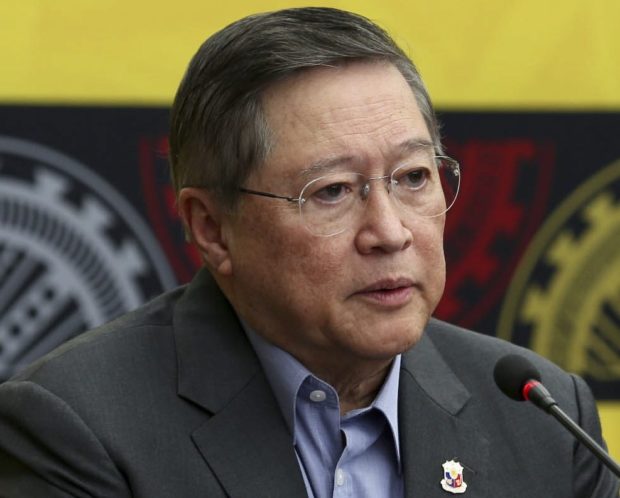
Finance Secretary Carlos Dominguez III. MALACANANG FILE PHOTO / RICHARD MADELO
MANILA, Philippines — President Rodrigo Duterte’s economic managers on Wednesday said ramping up mass vaccination would fast-track recovery from the pandemic-induced economic slump but a global vaccine supply shortage might delay the country’s drive to herd immunity.
Finance Secretary Carlos Dominguez III, speaking at the Senate deliberations on the proposed P5.02-trillion national budget for next year, said about 36.2 million doses of COVID-19 vaccines were already administered as of Sept. 6, of which 20.9 million were used as first doses and 15.3 million as second doses.
As of Sept. 3, 52.8 million doses had been delivered to the country and 142 million doses are expected to arrive before this year ends, Dominguez told members of the Senate finance committee.
He said the government had closed deals for the delivery of 9 million COVID-19 vaccine doses per week but that supply constraints might cause it to miss its goal of achieving herd immunity by the first quarter of 2022.
“We have already ordered it; we have set aside the money for it. Now it is up to the pharmas (pharmaceutical companies) to deliver. And so far, this first week of September, we are already short,” Dominguez said.
“Last week, I think we only got 3.5 [million doses]. So it is a matter of supply. Everything is already there—the order is there, the negotiations have been completed, the money is ready. Now we are waiting for the pharmas to step up to the plate,” he added.
Suspended agreements
Also on Wednesday, National Task Force chief implementer Carlito Galvez Jr. said delays were expected in the delivery of 1.8 million Moderna vaccines, 4 million Pfizer vaccines, and about 6 million doses from the COVAX facility. He cited the global “supply slippage” and the vaccine export ban in India as among the main causes.
Galvez said the country was hoping to get 3 million Moderna doses in September and another 15 million doses spread over the next three months.
“For now, we have [also] suspended the tripartite [agreements with local governments]. Because, first and foremost, there is really no supply. Manufacturers (of AstraZeneca, Moderna, and Sinovac) also wanted to supply vaccines to the national government for now,” he said.
Galvez said the makers of Pfizer, Sputnik V and Janssen vaccines were not open to dealing with local governments, while India’s Novavax and Covaxin would not make any delivery until the export ban is lifted in 2022.
The Russian Sputnik V manufacturer would only have to fulfill the delivery of the remaining 190,000 doses of the vaccine’s Component II and then shift to a single dose vaccine, he added.
Changes due to Delta
Also at the Senate budget hearing, Socioeconomic Planning Secretary Karl Kendrick Chua cited new studies suggesting that the more infectious Delta variant and other emerging variants might require a higher level of herd immunity, or more than the 70 percent of the population, the goal adopted by many countries across the globe.
Chua, who heads the state planning agency National Economic and Development Authority, said the agency was monitoring if COVID-19 would become endemic like the flu, for which yearly vaccination may be required.
Next year’s budget proposal had set aside P45 billion for booster shots but the amount was only included in unprogrammed appropriations pending a decision by the Inter-Agency Task Force for the Management of Emerging Infectious Diseases to require boosters.
Go-signal to vax minors
Unlike regular budget items, unprogrammed appropriations can only be funded by excess revenues or additional foreign borrowings.
As to other aspects of the inoculation drive, Galvez said the task force was still awaiting the advice of medical experts on whether 12 to 17-year-olds can now be given Pfizer shots.
About 20 percent of the total target population have been fully vaccinated, he said. In Metro Manila, 81 percent, or about 8 million people, had received the full dose, he reported.
Meanwhile, several local governments were forced to suspend their vaccination drives on Wednesday due to Typhoon “Jolina.”
The suspensions were announced in the cities of Mandaluyong, Makati and Muntinlupa in Metro Manila; and in the provinces directly affected by Jolina, like Albay, Masbate, Camarines Sur, Romblon and Sorsogon.